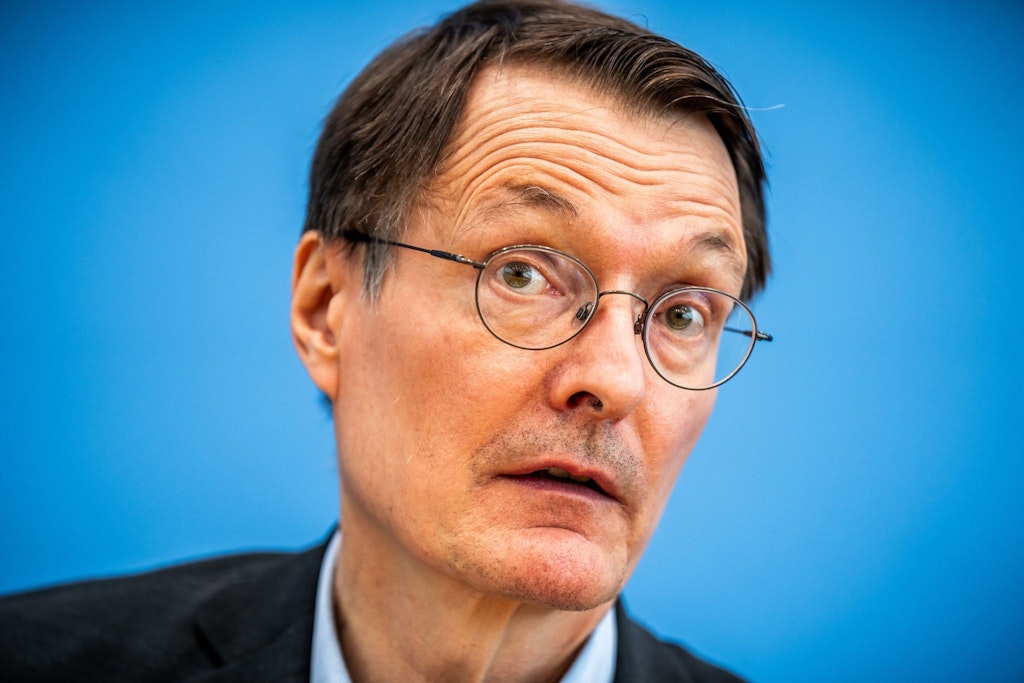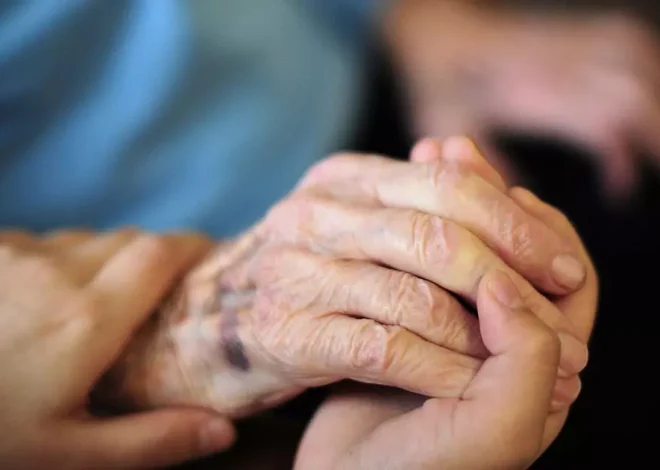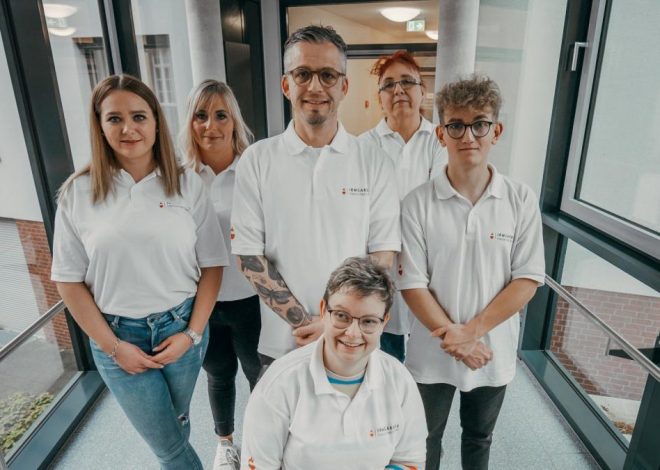
Lauterbach should not be surprised
Oops, people thought on Monday: Health Minister Karl Lauterbach announced in an interview with the Redaktionsnetzwerk Deutschland (RND) that the number of people in need of care had increased by an astonishingly high number last year: instead of the expected increase of 50,000 people affected compared to the previous year, there was an increase of more than 360,000 people in need of care across Germany.
Karl Lauterbach also apparently thought, “Oops.” And he probably also thought, “What am I going to do with all these new people in need of care, when the five million people who are already in need of care are often only being adequately cared for, partly because of the nursing shortage?”
His reaction now is: He wants to shift the costs.
“The minister suggested that social assistance for those in need of care should in future be paid out by the nursing care fund instead of by the social welfare offices,” reports ZDF. His reasoning sounds louder: “Many of those affected find it degrading to have to rely on the social welfare office at the end of their lives, in which they have worked hard,” Lauterbach told the RND. “That is why we need to destigmatize this support.”
However, as much as he is right that those in need of care must at least be allowed to retain their dignity at the end of their lives, the assumption that this could be achieved by means of a shift in funding is inadequate.
Of all people, the nursing care funds are supposed to fix it?
In the past, many nursing care funds have been anything but generous or accommodating in cases requiring care, and legal disputes over documented benefits sometimes have to be conducted for years. Not that things are fundamentally different with social welfare offices. It just doesn’t help those in need of care much if they have to turn to another funding agency. It would have to be someone who is known for treating patients better than the social welfare office for Lauterbach’s calculations to work.
So, apart from playing the role of a shunting yard, the health minister has little in store to respond to the new challenge other than being “alarmed”. In an interview, he also said that the level of care services cannot be maintained with the current contribution system alone. A comprehensive care finance reform will probably not be possible in this legislative period, but it will have to come in the next one. Because there is an “acute problem in care insurance”.
In other words: the care system is already so overloaded that we can’t use the additional people in need of care. And since politicians are hardly interested in care or even in the largest care service, the family caregivers, it should come as no surprise that people are also playing dumb when it comes to the possible reasons for the increase in the need for care.
The most absurd thing about it is that it is all homemade.
For decades, nursing scientists, half of the industry and the media have been warning that nursing in Germany will collapse if it is not fundamentally put on a new footing. But one health minister after another fails miserably to change anything fundamental – and thus make Germany fit for the future.
On the contrary: We Germans are running blindly into a catastrophe whose extent no one can really imagine. Due to the age pyramid alone, there will be fewer and fewer skilled workers who can care for the elderly and sick. As Lauterbach rightly stated, this is already the case. For the first time, there are two generations that are simultaneously dependent on care to a large extent: “the baby boomers and their parents.”
In addition, baby boomers are also retiring among the nursing staff. So they are not only leaving the workforce in large numbers, but some of them will also have to be cared for themselves. But by whom? And with what means?
Higher care costs are passed on to patients
It is not without reason that the Minister of Health immediately sees the social security system in distress when it comes to people in need of care: care has become so expensive in Germany that more and more people are becoming socially dependent after they have sold their house and property (if they have any at all). Only then does the state have to step in. Before that, patients become poor because of their own care. Nursing care insurance is not a full insurance policy, it only covers a small part of the – often horrendous – costs of care.
This is also because these care costs are getting higher and higher, most recently due to the increase in wages in the care sector, which Jens Spahn (CDU) claimed would not be passed on to those in need of care, whereupon his successor Karl Lauterbach (SPD) later had to sheepishly admit that this was indeed the case. Solutions for all these situations that have been botched by politics are – as Lauterbach must now admit again – not in sight.
While we’re on the subject of costs and burdens, these are largely borne by the relatives of those in need of care. What many people – even doctors and nursing staff – don’t know and therefore needs to be emphasized again and again is that the vast majority of those in need of care are not cared for in nursing homes (only 16 percent), but at home (84 percent). There, almost three quarters are cared for by their relatives alone, without additional nursing services. Firstly, because many relatives want to spare their loved ones from having to go to a nursing home, also because of the nursing shortage (80 percent are afraid of ending up in a nursing home). But also because, despite the often inadequate care conditions there, care is becoming increasingly expensive.
Relatives are taking on incalculable risks, as many become ill as a result of caring for their loved ones, reduce their workload and/or end up in poverty in old age.
Last but not least, their selfless commitment is neither socially nor financially recognized: contrary to many prophecies of doom, there is no pay for family carers. There is only a so-called care allowance, which, depending on the level of care, is barely enough to maintain care and is only intended for the patient.
If relatives stopped caring, there would be 100 billion in wage costs
The relatives maintain nursing care in this country with their commitment – often around the clock. If they all stopped working today, the social association VdK once calculated, the state would have to cover around 100 billion euros in wage costs for additional nursing staff – every year. But those nursing staff don’t even exist. So why doesn’t the state treat these indispensable relatives much better?
And why don’t relatives get paid for their often exhausting work? A recent AOK survey found that they spend an average of 49 hours a week caring for people, often in addition to their job. It’s obvious that this can’t be healthy. And the next cases of follow-up care are already waiting in the wings.
Again, this is due to political failures that are passed on to the individual – and then often end up burdening the state again. It’s a vicious circle.
But politicians are simply not interested in the relatives who provide care – depending on the count, there are up to ten million of them. On the contrary: when the so-called Care Bear was presented to a number of relatives who provide care in Berlin’s Red City Hall on Saturday to honour them at least in spirit – which is a very nice gesture (and, given the gratitude of those honoured, downright touching), the Governing Mayor of Berlin, Kai Wegner (CDU), cancelled his attendance at short notice. And Ina Czyborra, the Senator responsible for care (SPD), sent her greetings via video message. So no one from politics was there. Real appreciation for the mainstay of care in Germany, the largest care service in the nation, looks different. Apparently people deliberately do not want to see the problem.
Good morning Berlin
Newsletter
Thank you for signing up.
You will receive a confirmation by email.
Politics and society are not interested in care
And so one day all of this will come crashing down on us, not just in individual cases but also as a society. So far, the nursing shortage has been inadequately managed. When a nursing worker calls the fire brigade here and there because there are not enough staff in a care home, the care home in question is usually quick to claim that everything is completely different.
The law enforcement authorities also sometimes appear resigned or uncommitted to solving even the most serious cases of abuse and even death, as not only relatives or nursing staff say behind closed doors and not least the Niels Högel case, the largest series of murders in post-war Germany, showed. And all of this is just because of the nursing shortage and because in our performance-oriented society we prefer to look away rather than look at illness, death and nursing.
The new nursing cases are likely to be related to the long-term effects of the pandemic
This turning a blind eye has now reached a new high point in the statements of Karl Lauterbach, who should actually be responsible for at least knowing more at the moment: When asked about the reasons for the “explosive” increase in the need for care, he says: “We do not yet understand exactly why this is the case.”
Others could probably explain that to him quite well. For example, the vaccine-damaged people who have been knocking on his door for years and practically begging for care – after Lauterbach himself had long claimed that there could be no vaccine damage from mRNA, and certainly no long-term damage.
And Long Covid, which he himself likes to mention because the vaccination against Corona should actually protect against exactly that, among other things, may have also affected some of the new people in need of care.
As a health minister, you could know all of this, you could even count the cases reliably – and in the best case scenario, care for them in such a way that no one becomes permanently in need of care. But if you want to have little or nothing to do with vaccine damage, for example, so as not to jeopardize possible further campaigns, or the use of mRNA in other therapies, for example against cancer, then you prefer not to look too closely. And leave the injured and those in need of care alone with their millions of relatives.

Ethel Purdy – Medical Blogger & Pharmacist
Bridging the world of wellness and science, Ethel Purdy is a professional voice in healthcare with a passion for sharing knowledge. At 36, she stands at the confluence of medical expertise and the written word, holding a pharmacy degree acquired under the rigorous education systems of Germany and Estonia.
Her pursuit of medicine was fueled by a desire to understand the intricacies of human health and to contribute to the community’s understanding of it. Transitioning seamlessly into the realm of blogging, Ethel has found a platform to demystify complex medical concepts for the everyday reader.
Ethel’s commitment to the world of medicine extends beyond her professional life into a personal commitment to health and wellness. Her hobbies reflect this dedication, often involving research on the latest medical advances, participating in wellness communities, and exploring the vast and varied dimensions of health.
Join Ethel as she distills her pharmaceutical knowledge into accessible wisdom, fostering an environment where science meets lifestyle and everyone is invited to learn. Whether you’re looking for insights into the latest health trends or trustworthy medical advice, Ethel’s blog is your gateway to the nexus of healthcare and daily living.



